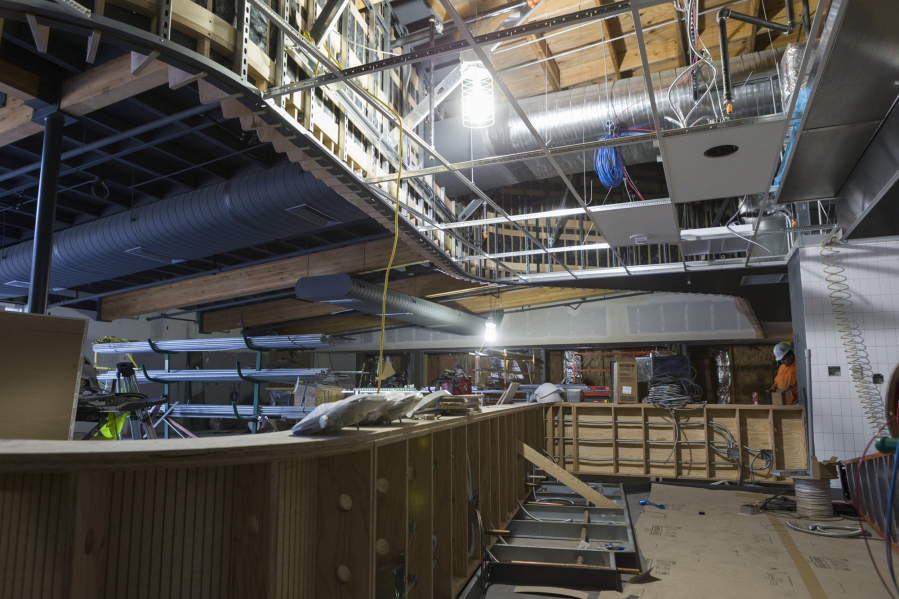Aspiring chefs eager to utilize Clark College’s new state-of-the-art culinary facility will have to wait just a little longer for it to finish cooking.
The McClaskey Culinary Institute, originally scheduled to open at the start of the fall quarter — which began Monday — is expected to begin hosting classes in the third week of the term, according to Genevieve Howard, the college’s dean of workforce, technical and professional education.
“Construction is a fickle thing,” Howard said. “So we always knew that a Plan B was gonna be there.”
Plan B meant that students are focusing for now on safety training, history, professionalism and theoretical concepts.
And Plan B was essentially the plan anyway, said culinary instructor Aaron Guerra. Even if the construction had been completed before the fall quarter, Guerra said the students still would have spent the first few weeks in a classroom before entering the kitchens in the new facility.
“We don’t have a classroom in the new facility,” Guerra said. “So we would be in a classroom (in another building) anyway.”
Officials had hoped the college would be granted occupancy on Monday, but Bob Williamson, vice president of adminstrative services, said that unexpected delays in installing electrical systems have in turn delayed getting the occupancy permit.
Williamson said officials don’t have a target date yet for that clearance.
Howard said the kitchens will still have to be stocked and equipped before classes can begin there.
Project manager Jim Watkins said the facility’s completion has been “coming along slowly, day by day” with a long list of small things left to do.
Watkins said the project has already exceeded its original $6.9 million budget, with crews working overtime after a wet winter and bad soil conditions under the floors set them back — something that has hampered construction throughout the region.
Guerra said that the “completely modernized” 20,000-square-foot facility will be the only one of its kind at a community college within 120 miles since Le Cordon Bleu in Portland closed this year following changes in state funding to for-profit colleges.
According to Howard, the institute will also be able to take Le Cordon Bleu’s place by offering the same level of education at a lower price.
“At Le Cordon Bleu, I think, a one-year certificate was around $30,000, and a two-year degree was around $45,000,” Howard said. “A two-year degree, with books and everything included, is less than $15,000 (at Clark College).”
Cooking instructor Earl Frederick said the safety certification, along with critical thinking and hands-on experience, will be critical for students entering the workforce.
“Our whole goal with this operation is to leave (graduating students) job-ready. We’ll work a lot on those interpersonal skills in here, not just practical skills,” Frederick said. “Businesses like Nike have 20 or 30 different food outlets, and people don’t even know. (The Pacific Northwest) is a hub for business dining.”
According to Guerra, food jobs imported from Portland could also help the institute succeed.
“People forget that we are just right there, the bridge is just right there,” Guerra said. “We’re still the Pacific Northwest, we still have the brilliant minds and people who want to eat well and live well and things that people associate with Portland.”
A new hangout
The facility not only benefits the culinary program, though. It also provides a new space for all students to gather and socialize.
“There’s really a blending of the outdoor and the indoor space,” Howard said. “A place where you can get food and hang out, I think, is gonna be really beneficial for students. You’ll have the food court and the kiosks and grab-and-go salad bar type stuff, and next year the restaurant will open up.”
Food prices remain up in the air as culinary instructors try to provide affordable options while staying financially viable.
“Will it be the level of pricing you see outside of campus?” Guerra said. “No, it’ll be below that. But will it be more relevant to the industry and what we have to pay to make the food? Yes.”
The culinary department is divided into cuisine and professional baking and pastry. Howard said that the baking classes are almost at their 30-student capacity, while the cuisine classes were at between half and two-thirds enrollment and still processing applications as of Sept. 13. The Dean also said the lower enrollment for cuisine might be due to the fact that the program hasn’t been offered by Clark for the last three years, as opposed to baking’s one-year hiatus.
“(Cuisine and baking) both offer a one-year certificate and a two-year associate’s degree,” Guerra said. The next step “really depends on the individual. They could go to the (Bachelor of Applied Sciences in Applied Management program), transfer to (Washington State University Vancouver) for the hospitality program, and then there are other options outside Vancouver.”
While there are only two courses in cuisine this quarter, Guerra said the future is wide open in terms of what skills could be taught.
“Right now, we’re just focusing on trying to get the facility open and the new cohort of students in and settled,” he said. “Year two, when we have the restaurant open and student-run, that’s when we’ll be a little more creative and flexible with stuff outside the content we already have.”
Benji Grundner is a senior reporter for The Independent, Clark College’s student newspaper. This story was written as part of a collaboration with The Columbian called Voices From Clark College. It was also published in The Independent.



